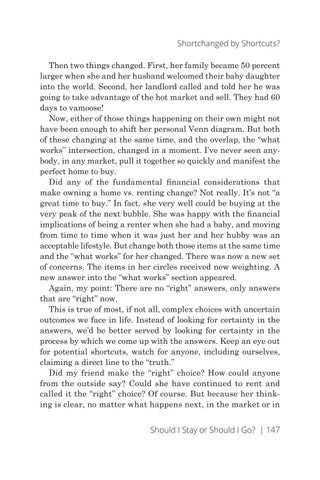Shortchanged by Shortcuts? Then two things changed. First, her family became 50 percent larger when she and her husband welcomed their baby daughter into the world. Second, her landlord called and told her he was going to take advantage of the hot market and sell. They had 60 days to vamoose! Now, either of those things happening on their own might not have been enough to shift her personal Venn diagram. But both of these changing at the same time, and the overlap, the “what works” intersection, changed in a moment. I’ve never seen anybody, in any market, pull it together so quickly and manifest the perfect home to buy. Did any of the fundamental financial considerations that make owning a home vs. renting change? Not really. It’s not “a great time to buy.” In fact, she very well could be buying at the very peak of the next bubble. She was happy with the financial implications of being a renter when she had a baby, and moving from time to time when it was just her and her hubby was an acceptable lifestyle. But change both those items at the same time and the “what works” for her changed. There was now a new set of concerns. The items in her circles received new weighting. A new answer into the “what works” section appeared. Again, my point: There are no “right” answers, only answers that are “right” now. This is true of most, if not all, complex choices with uncertain outcomes we face in life. Instead of looking for certainty in the answers, we’d be better served by looking for certainty in the process by which we come up with the answers. Keep an eye out for potential shortcuts, watch for anyone, including ourselves, claiming a direct line to the “truth.” Did my friend make the “right” choice? How could anyone from the outside say? Could she have continued to rent and called it the “right” choice? Of course. But because her thinking is clear, no matter what happens next, in the market or in Should I Stay or Should I Go? | 147
Issuu converts static files into: digital portfolios, online yearbooks, online catalogs, digital photo albums and more. Sign up and create your flipbook.




